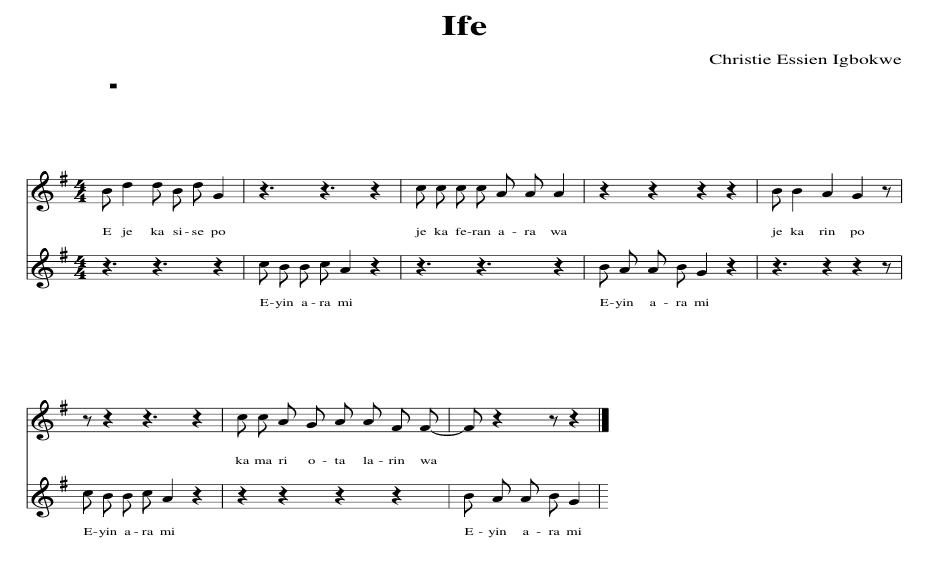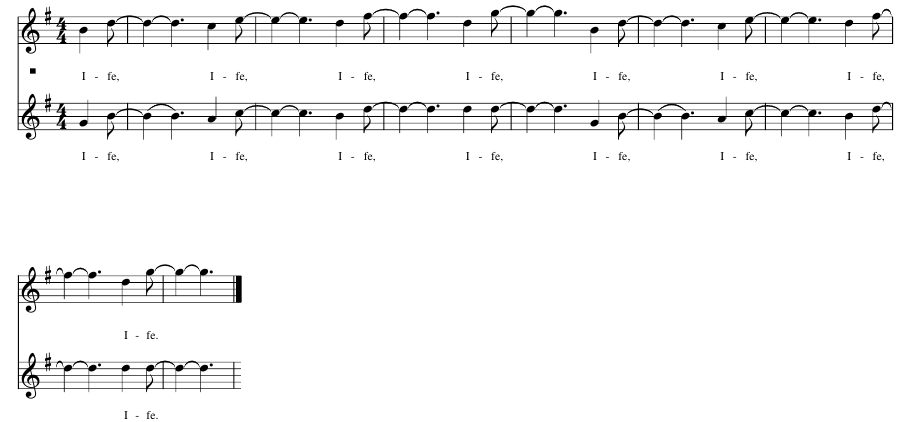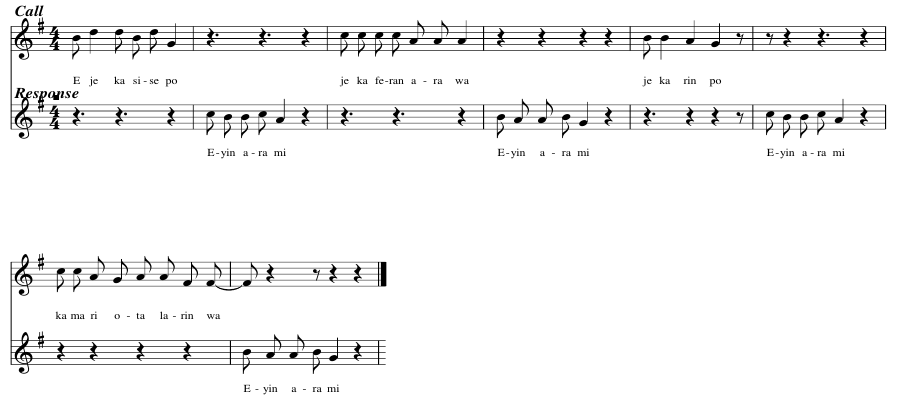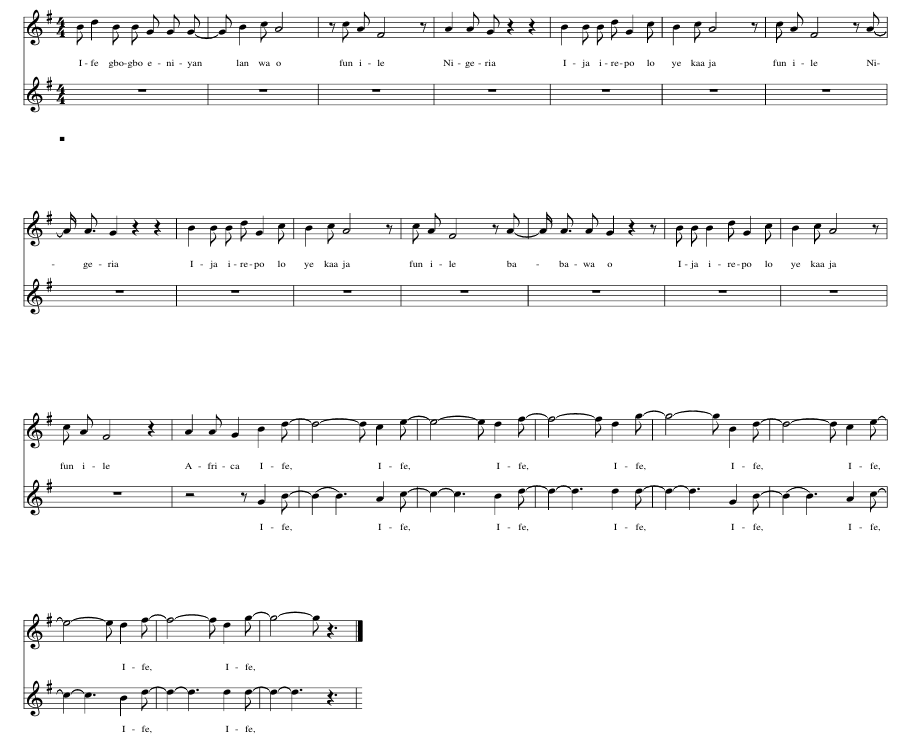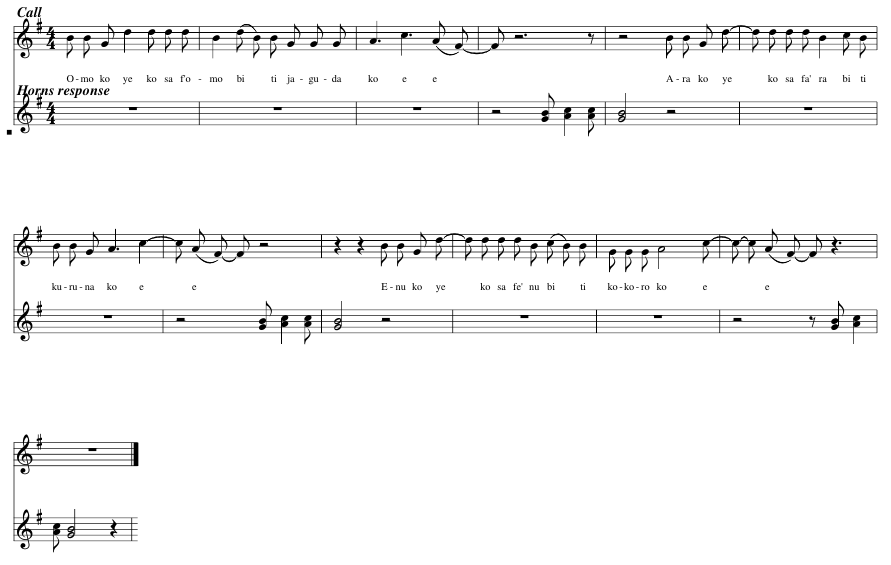UDC: 784.036.9
COBISS.SR-ID 59632393 CIP - 3
_________________
Received: Jan 15, 2022
Reviewed: Jan 24, 2022
Accepted: Feb 04, 2022
#6
Musical Track Analysys of
Christie Essien Igbokwe “Ife”
Emmanuel O. Alemede
Department of Music, Federal College of Education, Eha-Amuf, Nigeria
[email protected]
Department of Music, Federal College of Education, Eha-Amuf, Nigeria
[email protected]
|
Citation: Alemede, Emmanuel O. 2022. "Musical Track Analysys of Christie Essien Igbokwe Ife." Accelerando: Belgrade Journal of Music and Dance 7:6
|
Abstract
Christie Essien Igbokwe (1960-2011) was popularly known as “Nigeria's Lady of Song”. In her music Essien addressed many issues, such as love among people, community, association, woman-man relationship, childhood. Moreover, her passion for peace, equity and fairness put her among those that championed the creation of some States, specifically Akwa Ibom and the new Anambra. In addition, this resulted in the abrogation of obnoxious laws, such as onshore/offshore oil dichotomy which benefited the littoral states more but gave peace to the country as a whole. Accordingly, in this musical track review of her reggae song “Ife”, from the album of 1980 titled “Give Me a Chance” (labels “Apex Entertainment”), the author will show that her impact across the country was such that whatever language she used to communicate her message evoked emotion and reflection. Her song titled Ife meaning love in the English language. The song laid so much emphasis on the need for togetherness in love as a nation and continent. She advised on the need to put aside all forms of grievances and uphold unity. She pointed out the attributes expected of the people in order to make Nigeria great.
Keywords: Nigeria’s Lady of Song, Ife, sogs, musicians, Advisory and Counselling Musicology
|
|
Call: E je ka sise po
Response: Eyin ara mi Call: Je ka feran ara wa Response: Eyin ara mi Call: Je ka rin po Response: Eyin ara mi Call: Ka ma ri ota laarin wa Response: Eyin ara mi |
[Let us work together
my people Let us like one another my people Let us walk together my people let us not find an enemy in our midst my people] |
Christie Essien Ife re-echoed the word ife meaning love in a higher notes different from the notes of the body of the song building it up in a crescendo form. A musical and lyrical notation of the refrain is given below in the Example 1b:
The last section of the song advice on the issue of association. It is good to keep company but not just any company. Easterlin (2012) in Mertika et al (2020) on the issue of relationship as relating to social relationship pointed out:
It is widely accepted that social relationships and contacts are an important part of people’s lives. People are primarily social beings who seek physical contact with other people as well as strong emotional ties. Social relationships have been indispensable in the development of our species and their role in human survival has been widely documented and generally accepted. (Easterlin 2012 cited in Mertika et al. 2020)
Each line of that section ended with an emphatic gesture in words e e which could be termed to mean “can you hear me” or “do you understand”. It’s a way of enforcing an order or information or an exclamation in Yoruba culture. Below is the lyrics of the section in Yoruba and interpreted in English.
Omo ko ye ko sa fun omo bii ti jaguda ko
Ara ko ye ko sa fun ara bii ti kuruna ko
Enu ko ye ko sa fun enu bii ti akokoro ko
[It is not forbidden for children to congregate but no as thieves.
It is not forbidden for bodies to interact but not with skin rashes.
It is not forbidden for mouth to kiss but not with tooth decay.]
Ara ko ye ko sa fun ara bii ti kuruna ko
Enu ko ye ko sa fun enu bii ti akokoro ko
[It is not forbidden for children to congregate but no as thieves.
It is not forbidden for bodies to interact but not with skin rashes.
It is not forbidden for mouth to kiss but not with tooth decay.]
A musical and lyrical notation of the section is given below as in Example 1c:
MUSICAL FORM
The song ife from the album Give Me a Chance by Christie Essien Igbokwe is in two forms or a mixed structural form. The song started with a call and response in which the soloist calls while the backups respond with a short phrase:
This is followed by solo and a chorused refrain. This is a form of singing in Africa in which the solo and the chorus refrain are completely different in text and melody:
The last section of the song has a solo and instrumental response carried out by the horns section:
The section closes with a repeat of the refrain Ife till fade out. (See Example 1b)
MUSICAL EVALUATION
Although the concept of advisory and counselling musicology is new in music scholarship, these have been used over the years by musicians in theory and practical musicianship. The song is more of advice and a plea. The musical track its unique focus is on love and unity. The use of the western musical instrument is more prominent, and the lyrics are predominantly Yoruba.
Although the concept of advisory and counselling musicology is new in music scholarship, these have been used over the years by musicians in theory and practical musicianship. The song is more of advice and a plea. The musical track its unique focus is on love and unity. The use of the western musical instrument is more prominent, and the lyrics are predominantly Yoruba.
Conclusion
Christie Essien Igbokwe, in her song, focuses on the theme of love and unity, as the only way in developing the nation and not dwelling on the cultural divides and believes. This song is not only addressing individuals but addressing the leaders in the various arms of government. To get the job done, all hands must be on deck.
References
|
This website is under Attribution-NonCommercial-NoDerivatives 4.0 International (CC BY-NC-ND 4.0)
Belgrade Center for Music and Dance is the publisher of Accelerando: BJMD
Belgrade Center for Music and Dance is the publisher of Accelerando: BJMD


